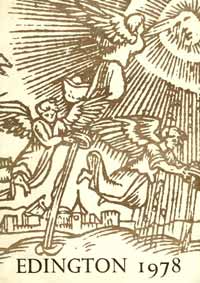
The figure of Christ in Majesty dominates this year’s Festival. With themes drawn from or related to the Book of Revelation, it is the vision of Christ Triumphant, the Lamb Victorious, sitting on the Throne of God, surrounded by the orders of angels and the multitude of the saints that is the inspiration for this week of intense liturgical activity. And when one considers the density and complexity of the worship, the Festival must represent one of the most concentrated weeks of music in the liturgy anywhere in Christendom.
The worship of the Festival is founded on a regular daily pattern of Morning Office, Eucharist, Evening Sequence and Night Office. The two central and most elaborate services – the Eucharist and the Evening Sequence – trace complementary themes concerned with the wonder of the Divine Power. The Evening Sequences are based on the early church’s concern with the imminence of the second coming, judgement and the end of time: the first part of the service is a shortened form of Evensong with a Gospel (or Acts) reading that introduces the theme, whilst the second part illustrates it with psalms, hymns, anthems and readings drawn from the apocalyptic visions of St. John the Divine. The Eucharist themes explore different aspects of the expression of the Divine Power – the power of Christ as King, of Christ in the Church, of the Holy Spirit, of the Apostles, of the Cross, of Christ in the Eucharist, and of the Saints.
In past years the Morning and Night Offices have been sung by all present, but this year they are sung by the Schola Cantorum. At a time when so many find vitality and renewal in the spontaneity of the charismatic movement it is important to value the worth of ordered liturgy. The Eucharist and Sequence fulfil one fundamental aspect of formal liturgy – that of corporate involvement, in which all the choirs, priests, servers and people have an active part, however small; the Morning and Night Offices provide another – that of an ordered period for contemplation and meditation. In the long run the validity and vitality of the Festival (and of the Church at large) will rest not on the degree of involvement in the Eucharist or of intellectual or spiritual stimulation in the Sequence, nor for that matter on the inspiration of any charismatic experience, but on the strength of the prayer achieved undramatically through the quiet of contemplation and meditation. In the choral singing of the Offices (as indeed in all the music of the Festival) it is not the intention to exclude, but rather to involve by opening minds to new thoughts, to ponder in beauty, and so to pray.
John Harper
